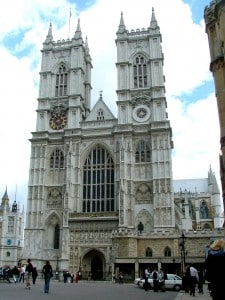
After her death on 24th March 1603, the body of Queen Elizabeth I was placed inside a lead coffin and carried by night in a torchlit barge along the Thames from Richmond Palace to Whitehall. There, the Queen was to lie in state until her funeral, giving time for King James to travel down to London. While the coffin lay in state, a life size effigy of the Queen, dressed in her royal robes, was placed on top of it to act as a symbol of the monarchy while there was no monarch in England.
On 28th April 1603, Elizabeth’s coffin was carried from Whitehall to Westminster Abbey on a hearse drawn by horses hung with black velvet. The coffin was covered in a rich purple cloth, topped with the effigy of Elizabeth with a sceptre in her hands and a crown on her head. Above the coffin was a canopy supported by six knights, and behind the hearse was the Queen’s Master of the Horse, leading her palfrey. The chief mourner was the Countess of Northampton who led the party of peers of the realm, all dressed in black. Chronicler John Stow wrote:
“Westminster was surcharged with multitudes of all sorts of people in their streets, houses, windows, leads and gutters, that came out to see the obsequy, and when they beheld her statue lying upon the coffin, there was such a general sighing, groaning and weeping as the like hath not been seen or known in the memory of man.”
Elizabeth was then buried at Westminster Abbey in the vault of her grandfather, Henry VII, until she was moved in 1606 to her present resting place, a tomb in the Lady Chapel of Westminster Abbey which she shares with her half-sister Mary I. King James I spent over £11,000 on Elizabeth I’s lavish funeral, and he also arranged for this white marble monument to be built. The tomb is inscribed with the words:
“Consorts both in throne and grave, here we rest two sisters, Elizabeth and Mary, in hope of our resurrection.”
Taken from my book On This Day In Tudor History









